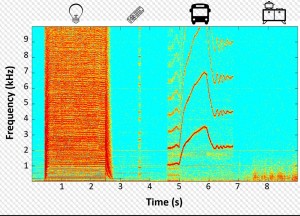 Earlier this month, we reported on MagnifiSense, a new low-power, wearable sensor system that tracks an individual’s usage of various devices that was developed by a team of UW CSE and EE researchers in the Ubiquitous Computing Lab led by professor Shwetak Patel.
Earlier this month, we reported on MagnifiSense, a new low-power, wearable sensor system that tracks an individual’s usage of various devices that was developed by a team of UW CSE and EE researchers in the Ubiquitous Computing Lab led by professor Shwetak Patel.
Today, GeekWire published an excellent article showcasing MagnifiSense that quotes Shwetak and EE graduate student Edward Wang, who presented the team’s research at UbiComp 2015 in Osaka, Japan last week.
From the article:
“The coolest thing about a new electromagnetic-radiation sensing device from the University of Washington might be the elegant simplicity of its design.
“Or maybe it’s the fact that the wearable tech gadget could be put to important uses, such as measuring someone’s carbon footprint, helping prevent injuries for older people with dementia, and blocking inappropriate content from kids when they turn on a computer or TV.
“Or perhaps the best thing about the MagnifiSense sensor, which was built from off-the-shelf materials bought at RadioShack, is that its potential uses are still being discovered….
“The MagnifiSense project began as something seemingly less ambitious than a tool for a greener-living or making grandma and the kids safer.
“‘Our original problem we were trying to solve was figuring out what side of the car you were sitting on,’ Wang said.”
Read the full article here and the original UW press release here. Congratulations to Shwetak, Edward, and the entire team – EE graduate student Tien-Jui Lee, CSE graduate students Mayank Goel and Alex Mariakakis, and CSE Ph.D. alum Sidhant Gupta of Microsoft Research – on this well-deserved recognition.

